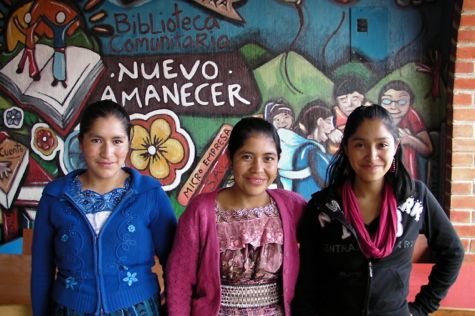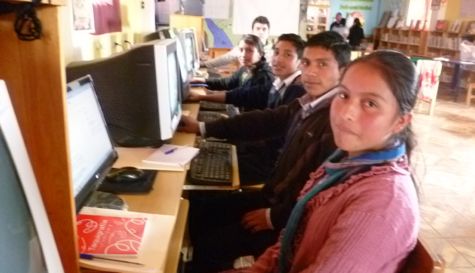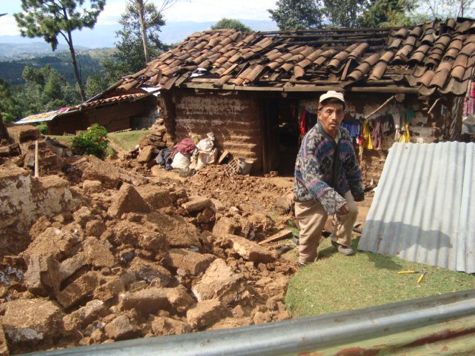This is the first in a series looking back at the activities of each of the 2012 grantees over the past year.
For the past year, the Rising Voices grantee project Xela Civic Libraries has been demonstrating how it can play a vital role in not only providing internet access for its users, but also providing them with a supportive environment to access information and share news important for their rural community. This work begins with the commitment of the librarians, who have the task of being local resources for their communities. By supporting the librarians as they support those who enter the library doors looking for assistance, users find a welcoming space with a knowledgable staff eager to promote active citizen participation.
Background:
In April 2012, Rising Voices awarded the Riecken Foundation a microgrant to begin the Xela Civic Libraries Project under the coordination of Romeo Rodríguez. The Foundation supports a network of libraries across Guatemala and Honduras through local community involvement and engagement. The Foundation is an active part of the Beyond Access initiative that seeks to explore how libraries can play a vital developmental role.
This pilot project started in three community libraries in the municipalities of Huitán, San Carlos Sija, and Cabricán in the Quetzaltenango Department. These libraries were chosen for their close proximity to one another and because their municipalities share many characteristics in common. Many of the indigenous residents live on the outskirts of town making a living through agricultural activities.
Following the passage of the Law for Free Access to Public Information by the Guatemalan government, there has been increased attention on how the legislation might affect rural populations. It has become an opportunity to introduce these communities to tools to search for information that matters in their daily life. Adding a component of citizen media also provides a way to showcase some of the important issues facing the communities and what takes place on a daily basis.
People:
In total, 30 participants including regular library users (ages 14 to 24) and librarians themselves took part in the workshops, meeting each day at the Cabricán library. Though the communities are only approximately 20 kilometers apart, there are not many opportunities for cross-community interaction. Coming together at these workshops made it possible for youth from the various location to get to know each other.

Librarians at the Nuevo Amanecer Library in Cabricán
The three librarians from the three communities, Román Díaz, Isabel Ramos, and Silvia Vásquez, played special roles in the training. In future, they would provide ongoing support to the library users upon completion of the access to information workshops and the citizen media training. Having full-time staff at each of the sites ensures library users can find assistance if they run into problems while creating online content.
Workshops:
The workshops included a focus on how to request information from public institutions around matters important to the community. Implemented by the local NGO Acción Ciudadana, they taught about the importance of public information and showed the youth how to make a request. Many of the youth were curious to see how public funds were being used by their local communities, and requests were made to the Ministries of Finance, Education, Energy and Mining, and Culture.

Blogging workshop in Cabricán
The blogging workshops were led by Kara Andrade, Bea Gallardo, and Oscar Gaspar, providing interactive instruction on how to create and manage personal blogs, and focusing on the group library blog. Managed by each librarian, these group blogs encourage active contributions from the community group.
Major Events:
In November 2012, a major 7.4-magnitude earthquake struck off the coast of Guatemala. In these types of natural disasters, rural areas care often the hardest hit and most neglected by relief . Rural departments in Guatemala suffered the most damage, leaving them further isolated with few opportunities to send news out about the damage, or to request aid.
However, Román Díaz – a librarian from Huitán – took the initiative to document some of the worst-affected locations across the municipality. Through pictures and reports published on the library blog and shared through Facebook, Román helped to mobilize assistance from the municipality and concerned citizens.
Following receipt of this aid, the library's blog documented follow-up reconstruction and the distribution of assistance. Román also blogged an update fifteen days after the earthquake showing the need for further help. This use of alternative communications technologies exemplified how new knowledge of citizen media tools empowered local citizens to report on their reality in times of need.
Challenges:
Access to quality internet continues to be a major obstacle for rural libraries. Broadband internet is not available, and connection is restricted to USB 3G modems. With data limits placed on the account, the connection must be rationed across computers in the libraries throughout the month. Reliance on this type of connection is further frustrating as the modems are prone to sudden breaks in coverage or drops in speed, making uploading content difficult. But despite these challenges, the libraries have made the most of the connection provided, often with the assistance of the local municipality's contributions.
Future Plans:
Seeing the work at these libraries – and its effects – has caused others in the network to take notice. Using blogs and sharing information on social networks has provided these libraries an important online presence to complement their physical presence within these local communities. It has also provided ways to communicate with supporters living abroad, as a way to follow the daily work of the libraries. Other libraries have requested help to start their own blogs or creating their own social networking accounts.
With the hire of Israel Quic as Program Officer, Riecken plans to offer additional technology support in the field for more libraries in the network. Formerly director of the Rija'tzuul Na'ooj Library in San Juan La Laguna, Guatemala, Israel created and maintained the library's blog, frequently updating about the library and community activities. Currently, he is creating a curriculum for use starting in two libraries in Guatemala and one in Honduras, and the plan is that this curriculum will be implemented in all participating libraries.
Across the network, the Foundation has made it a priority to upgrade hardware and internet connectivity in as many libraries as possible, making it possible to expand the types of activities they can offer.
Recently, the Foundation launched a new business center where artisan women, especially those involved with weaving, are learning how to use digital tools to improve their product's marketability with the goal of increased sales. Micro-economic development via participating libraries is another element that has the potential to be replicated across the network.
Citizen Media Links:
Nuevo Amanecer Library, Cabricán
Mi Nuevo Mundo Library, Huitán
Fuente de Sabiduría Library, San Carlos Sija





3 comments